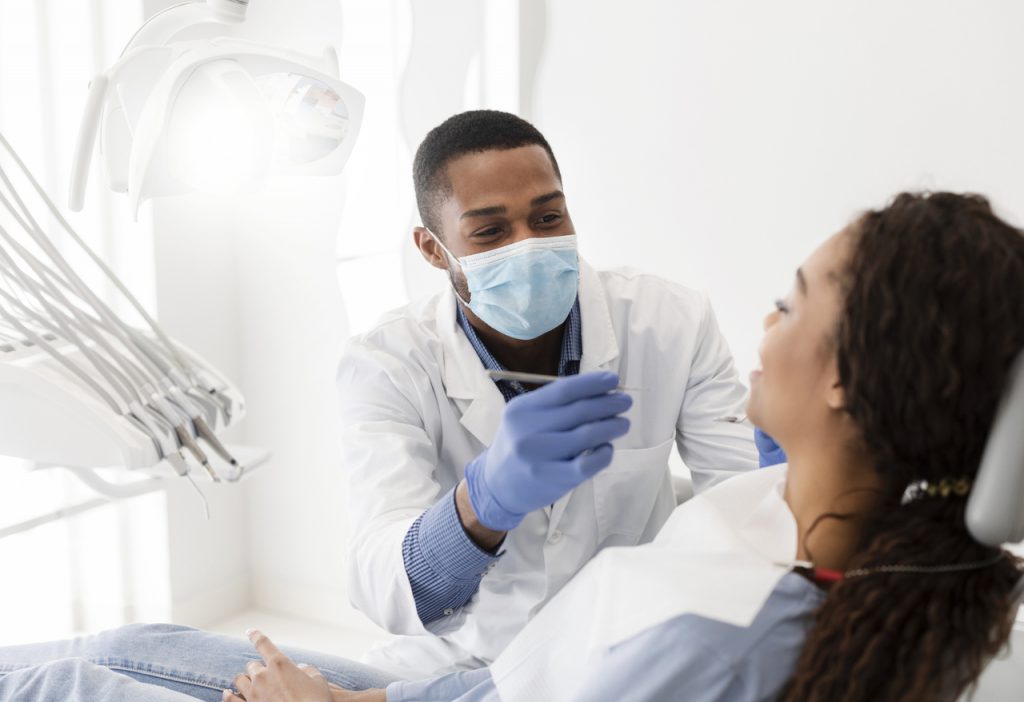Six Non-Dental Health Issues Your Dentist Can Identify During a Check-Up
by Carolyn Lee Nov 1, 2021

When it comes to dental check-ups, most of us expect our dentist’s comments to be about our oral health and dental care practices and most of the time, it is.
Dentists promote good dental hygiene, and they diagnose and treat problems related to the gums, teeth, and mouth. A dentist is a doctor and receives similar training to a medical doctor. They can identify oral health issues and non-dental health issues during an examination.
Diabetes, heart disease, HIV, anaemia, osteoporosis, and gastroesophageal reflux disease (GERD) are some diseases and conditions that exhibit signs in the mouth.
What are the oral symptoms of diabetes?
Dry mouth, receding, dry, bleeding gums and loose teeth are common oral symptoms of persons who have diabetes. Persons with type 1 and type 2 diabetes often struggle with periodontal disease. Periodontitis can cause gum shrinkage and loosening of teeth. Bleeding gums are a sign of gingivitis and gum disease. However, if your dentist notices that it takes you longer to recover from gingivitis and that you have frequent swollen gums and abscesses, they may recommend a diabetes evaluation.
How can a dentist detect heart disease from an oral examination?
Gum disease is common but preventable. However, if untreated, plaque feeding bacteria can enter the bloodstream through damaged gums, creating serious problems. If your dentist notices missing or loosened teeth with deep gum pockets, it could signify that bacteria have travelled to your heart. This may increase the risk of clots and plaque in arteries, coronary artery disease, and endocarditis (inflammation of the inner lining of the heart’s chambers and valves).
What are the signs or symptoms that may indicate HIV or AIDS during a dental exam?
During a dental check-up, your dentist will conduct a physical exam, take X-rays, ask about oral hygiene practices, overall health, and take pictures of your teeth. This will help to inform your dentist of what is happening with your mouth and overall health. Although oral thrush often occurs in infants and toddlers, it is also a common mouth problem for persons with HIV or AIDS. Oral thrush is a yeast infection in the mouth that produces yellow or white patches of bumps on the lips, tongue, tonsils, gums, or inner cheeks. Cold sores, dry mouth, warts from the human papillomavirus (HPV) and gum disease are also linked to HIV/AIDS.
Can your dentist tell if you have anaemia?
Your dentist may ask if you are anaemic if there is loss of colour in your gums, tongue, and other parts of your mouth. Persons who are anaemic do not have enough healthy red blood cells to transport oxygen to their organs. If your dentist detects that you are anaemic, a visit to your medical doctor and a haemoglobin test may be recommended. The most common type of anaemia is iron-deficiency anaemia, which can be eased by adding iron to your diet.
What are the oral symptoms of osteoporosis?
During a dental check-up, your dentist will review X-rays of your teeth. Dental X-rays can be used to check for osteoporosis, which is most common among postmenopausal women. Osteoporosis can affect the bones in your jaw that anchor your teeth. So, if you practice good dental care but have loose teeth and receding gums without signs of periodontal disease, this may be a sign of osteoporosis.
How does gastroesophageal reflux disease (GERD) affect oral health?
Your dentist may detect signs of GERD since acid reflux can damage tooth enamel. This condition causes acid from your stomach to regurgitate into the oesophagus and can result in heartburn, chest pain, and difficulty swallowing. The acid can also cause canker sores, dry mouth, and bad breath. Your dentist may ask about the medications (prescribed and over the counter) you are taking for a clearer idea of what’s happening.
If your dentist has identified a non-dental health issue and you need to find a medical doctor, health specialist, or related services near you, search our Find Yello listings.








